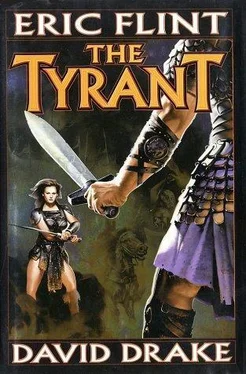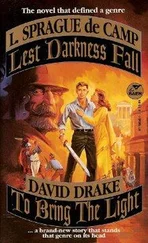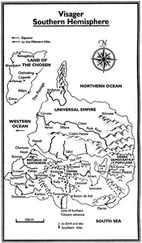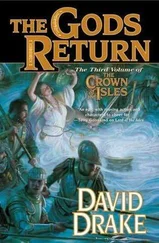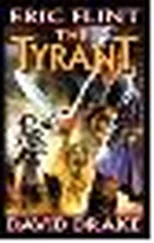David Drake - The Tyrant
Здесь есть возможность читать онлайн «David Drake - The Tyrant» весь текст электронной книги совершенно бесплатно (целиком полную версию без сокращений). В некоторых случаях можно слушать аудио, скачать через торрент в формате fb2 и присутствует краткое содержание. Жанр: Боевая фантастика, на английском языке. Описание произведения, (предисловие) а так же отзывы посетителей доступны на портале библиотеки ЛибКат.
- Название:The Tyrant
- Автор:
- Жанр:
- Год:неизвестен
- ISBN:нет данных
- Рейтинг книги:3 / 5. Голосов: 1
-
Избранное:Добавить в избранное
- Отзывы:
-
Ваша оценка:
- 60
- 1
- 2
- 3
- 4
- 5
The Tyrant: краткое содержание, описание и аннотация
Предлагаем к чтению аннотацию, описание, краткое содержание или предисловие (зависит от того, что написал сам автор книги «The Tyrant»). Если вы не нашли необходимую информацию о книге — напишите в комментариях, мы постараемся отыскать её.
The Tyrant — читать онлайн бесплатно полную книгу (весь текст) целиком
Ниже представлен текст книги, разбитый по страницам. Система сохранения места последней прочитанной страницы, позволяет с удобством читать онлайн бесплатно книгу «The Tyrant», без необходимости каждый раз заново искать на чём Вы остановились. Поставьте закладку, и сможете в любой момент перейти на страницу, на которой закончили чтение.
Интервал:
Закладка:
David Drake, Eric Flint
The Tyrant
PART I: THE TRIUMVIR
Chapter 1
When Verice Demansk had been six years old, his grandfather had taken him one day on a tour of the statuary in the gardens of the family's estate. The tour had finished in front of the statue of the All-Father.
"Whatever else you do," the old man had told him sternly, "make sure it will meet the approval of this god. The others-gods of love and war, the harvest, whatever-must always be respected also, of course. But, in the end, this god will be the judge."
Demansk was now a middle-aged man himself, with his own august presence, beard turning gray, long string of honors to his name, and bearing the title of Justiciar of the Confederation. His grandfather had died many years earlier. But, staring up again at the statue on a summer day, he could remember that moment perfectly. And he understood, finally, why his feet seemed to have brought him, without his even being aware of where he was walking, before this statue in the gardens.
He stared up at the painted marble face of the god for perhaps three minutes. Then, sighing softly, made his final decision.
Treason.
Another man would have called it something else. "The good of the nation," "the needs of the hour," whatever. Some wormy turn of phrase. But Verice Demansk would not. First, because he had never been given to euphemisms, nor to lying. Secondly-more important-because if he didn't think he was honest he wouldn't have made the decision to become a traitor in the first place.
"In this, as in many things," he said softly to himself, "evil is wasted on the wicked. Only the virtuous can truly plumb its depths, because only they have the necessary strength of conviction."
He recognized the thought as a modification of one of Prithney's Dialogues. And he found himself wondering, for a moment, what comment the father of his own grandchild might make about it. All Emeralds were prone to flights of philosophic fancy anyway, but Adrian Gellert was even a graduate of the Grove. A genuine Emerald scholar-a breed which Demansk had always thought was about as far removed as possible from the hard-headed practical way of thinking of such men as himself.
He mused on the contrast between grandfather and father, for a moment, still standing before the statue of the All-Father.
Demansk was a Justiciar of the Confederacy of Vanbert, the great nation which ruled half the world. Adrian Gellert had been born in Solinga, once the capital city-insofar as that term wasn't laughable-of the Emerald League, the collection of squabbling and quarreling city-states clustered on the north coast of the single great continent of the planet Hafardine.
The single great continent we know of, Demansk corrected himself. Emerald scholars had long since convinced their Vanbert conquerors that the world was round-and so, who was to say what lands might exist somewhere across the great Ocean?
The Confederation had conquered the Emeralds half a century ago. Demansk's own grandfather, in fact, had led the army which forced Solinga itself to capitulate.
And what would he think now, I wonder?
Demansk could still remember the old man vividly. Fierce old man, as accustomed-unlike modern noblemen-to working with pigs and leading farmhands in their labor as he was with the Council chamber and army maneuvers. And, though this was perhaps fancy, Demansk thought he could remember his grandfather muttering, after the conquest was over, that no good would come of it. " Damn Emeralds! Put three of them in a room, you've got eight opinions on any subject under the sun. They think too much! That's a disease, boy, nothing else. And it's contagious, so be careful. Stay away from the bastards. "
His lips quirked a bit. "Well, I tried, Grandfather," he whispered softly. "But…"
In this, too, he would be honest. It was always tempting to blame others for one's ills. But, in truth, the rot within the Confederacy of Vanbert was not of Emerald origin. If anything, he suspected, the Emeralds might be part of the solution.
One Emerald, anyway. Adrian Gellert, the father of Demansk's grandchild.
No, Demansk knew full well the Confederation was rotting from within, and the rot had no alien source. Simple greed, and sloth, and envy, and corruption-all homegrown. Like gout of the spirit. Inevitable, perhaps, a disease brought upon itself by a nation which had grown too powerful too quickly. Or, to use a more homely simile, the stomach-ache of a reckless child after stuffing himself at the dinner table.
Demansk's jaws tightened. He had just selected himself to be the purge, after all. And, here also, he would not hide behind simile and metaphor. His purge would be far more brutal than that of a parent forcing too much food out of a child. Blood, not vomit-though there would be plenty of that, too-would be the product of his labor.
That thought set his feet moving again, and he found himself wandering through the gardens anew. With the self-awareness that had always been part of him, Demansk understood within a short time where his feet were leading him.
Soon enough, he was there, standing before it. The statue of Wodep, painted in red. He stared up at the image, for a moment, his own green eyes meeting the black-painted eyes of the savage-looking idol. Then, lowered his head.
Not in hesitation or fear, simply in thought. He had never cared much for that statue. Odd, perhaps, given his undoubted skill at the god's art. But Demansk had never been an enthusiast of battle, much less a lover. That was why, he sometimes thought, he was so good at it.
No, his head was simply lowered in thought. Having decided upon treason, it remained to implement it. And some of that implementation would involve the clash of armies in the field. Some, not all-Demansk allowed himself the hope that much of it might be accomplished using less ferocious means.
But, as his thoughts of the coming campaign followed their own steps, he soon relinquished the hope. True, some of it would involve political maneuver. As ruthless as war, perhaps, though not as bloody. But some of it…
He could see no way around it. At the heart of Vanbert's rot lay the great landed estates. (His own numbered among them, he reminded himself.) They had, like a cancer, destroyed Vanbert's yeomanry and replaced it with a huge caste of slave laborers. Conquered foreigners, for the most part.
Demansk would do what he could to make the revolution as painless as possible. But he had no illusions. The overseers on his own estate were mild, by Vanbert standards. Demansk saw to it. But even his own slaves would be prone to violence when the yoke was lifted. The slaves on many of the great estates would explode like a volcano.
It would be… bloody. The more so because Demansk would not hesitate, as other would-be reformers had done, when the time came. When a new slave rebellion erupted, he would yoke it to his purpose. But doing so would require letting the thing burn itself out.
His head still lowered, he lifted his eyes beneath thick eyebrows and looked up at the statue again. It's not as if the All-Father hadn't warned us. Some crimes can only be purged with blood. The lash repaid by the hammer, or the hoe sharpened to an edge.
The statue's eyes, painted solid black like those of a monster, gazed back at him pitilessly. He could almost hear the god's imperious demand: "Do what you must! Be what you must! But give it a true name. Whatever else, do not lie to yourself."
And what am I? wondered Demansk. What am I to become?
"The reformer." He shook his head. Demansk was not a reformer, because "reform" was now impossible. The Confederacy of Vanbert could not be fixed, the way a broken machine is mended. The whole thing needed to be torn apart-wrecked completely-and built on different principles.
Читать дальшеИнтервал:
Закладка:
Похожие книги на «The Tyrant»
Представляем Вашему вниманию похожие книги на «The Tyrant» списком для выбора. Мы отобрали схожую по названию и смыслу литературу в надежде предоставить читателям больше вариантов отыскать новые, интересные, ещё непрочитанные произведения.
Обсуждение, отзывы о книге «The Tyrant» и просто собственные мнения читателей. Оставьте ваши комментарии, напишите, что Вы думаете о произведении, его смысле или главных героях. Укажите что конкретно понравилось, а что нет, и почему Вы так считаете.
